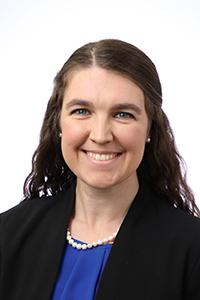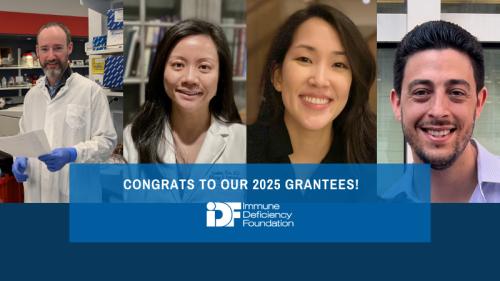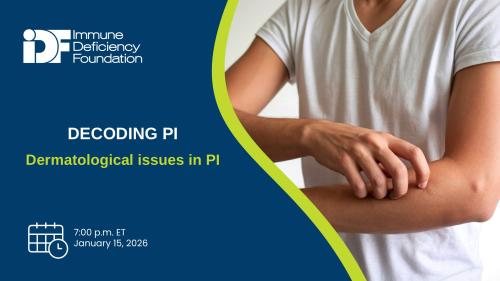
-
Understanding primary immunodeficiency (PI)

Understanding PI
The more you understand about primary immunodeficiency (PI), the better you can live with the disease or support others in your life with PI. Learn more about PI, including the various diagnoses and treatment options.
-
Living with PI
-
Addressing mental health
-
Explaining your diagnosis
- General care
- Get support
- For parents and guardians
-
Managing workplace issues
- Navigating insurance
-
Traveling safely

Living with PI
Living with primary immunodeficiency (PI) can be challenging, but you’re not alone—many people with PI lead full and active lives. With the right support and resources, you can, too.
-
Addressing mental health
-
Get involved

Get involved
Be a hero for those with PI. Change lives by promoting primary immunodeficiency (PI) awareness and taking action in your community through advocacy, donating, volunteering, or fundraising.
-
Advancing research and clinical care
-
Research Grant Program
-
Consulting immunologist
-
Diagnosing PI
-
Getting prior authorization
-
Clinician education
-
Survey research
-
Participating in clinical trials

Advancing research and clinical care
Whether you’re a clinician, researcher, or an individual with primary immunodeficiency (PI), IDF has resources to help you advance the field. Get details on surveys, grants, and clinical trials.
-
Research Grant Program
This article was originally published in the Fall 2024 edition of the IDF ADVOCATE newsletter. You can download or request a free print copy of the ADVOCATE.

The Immune Deficiency Foundation (IDF) is proud to fund four research projects totaling more than $150,000 through the 2024 IDF Research Grant Program. The top-scoring proposal, submitted by Dr. Emily Harris, a clinical fellow in pediatric hematology/oncology at Dana-Farber/Boston Children’s Cancer and Blood Disorders Center, received the Michael Blaese Research Grant Award. Harris plans to use the funding to investigate Evans syndrome, with the goal of developing better diagnostic and treatment tools.
“I am thrilled and incredibly honored to receive this award,” Harris said. “The support from IDF is instrumental in allowing this research to happen.”
Evans syndrome is a rare and chronic autoimmune condition in which the immune system destroys at least two different types of blood cells—typically platelets and red blood cells. In children, Evans syndrome often signals that the person has an underlying primary immunodeficiency (PI), also known as an inborn error of immunity (IEI). The destruction of blood cells, known generally as autoimmune cytopenia, is sometimes the person’s first clinical PI symptom.
However, the autoimmune cytopenias that define Evans syndrome don’t necessarily happen all at the same time. If an individual has a single episode of low platelets, for example, clinicians follow that person closely to ‘catch’ low cell counts across other blood cell types in order to make the Evans syndrome diagnosis. By that time, the individual has active and worsening autoimmunity that can be life-threatening.
Harris and her collaborators recently identified a group of T cells, named cTfm1/17 T cells, that may distinguish Evans syndrome from autoimmune cytopenias involving only one blood cell type. Initial data show that individuals with active Evans syndrome have a higher percentage of these cells than those with a single autoimmune cytopenia or those whose Evans syndrome is no longer active.
Harris suspects cTfm1/17 T cells don’t just correlate with Evans syndrome but actually cause it. She plans to look at these cells more closely to see what genes they have turned on or off. These gene expression patterns could hint at what the cells are doing, providing further clues on how they cause Evans syndrome.
Harris hopes her data will also lead to the development of a clinical test to detect cTfm1/17 T cells, which could supercharge diagnosis. Clinicians wouldn’t have to watch and wait but could proactively determine if someone with an autoimmune cytopenia has Evans syndrome and get them started on therapy faster.
The second part of Harris’ project focuses on another gap in caring for those with Evans syndrome—determining which treatment will be effective. As with other kinds of autoimmunity, treating Evans syndrome involves broadly suppressing the immune system with medications like steroids, rituximab, cyclosporine, sirolimus, and others. However, clinicians don’t know who will respond to which medication and there are no treatment guidelines. Clinicians rely on their own experience and trial and error to find the regimen that works for each patient.
To address this gap, Harris plans to use stored blood samples from patients with Evans syndrome to test whether medications that lower the percentage of cTfm1/17 T cells in the lab match those that were used to successfully treat each patient. If so, cTfm1/17 T cells could form the basis of not only a diagnostic test but also a prognostic test that helps clinicians choose the right treatment for their patients.
“Our goal is to study the immune systems of patients and then leverage this knowledge to not only find a diagnostic answer but also to predict which treatments are most likely to be effective,” Harris said.
An even longer-term goal is to develop a more specific treatment for Evans syndrome that doesn’t broadly suppress the immune system. Ultimately, specific treatment relies on understanding the underlying biology and how cTfm1/17 T cells fit into the Evans syndrome picture.
Harris explained, “By investigating the underlying immunobiology, we aim to discover new ways to treat patients with Evans syndrome and associated immune disorders more effectively.”
2025 Research Grants
We are now accepting 2025 research grant applications. Download the PDF application today.
Download PDF applicationRead other newsletter articles
The IDF ADVOCATE is the national newsletter of the Immune Deficiency Foundation, published twice a year. Download or request a free print copy of the newest edition!
Read newsletterTopics
This page contains general medical and/or legal information that cannot be applied safely to any individual case. Medical and/or legal knowledge and practice can change rapidly. Therefore, this page should not be used as a substitute for professional medical and/or legal advice. Additionally, links to other resources and websites are shared for informational purposes only and should not be considered an endorsement by the Immune Deficiency Foundation.
Related resources
Sign up for updates from IDF
Receive news and helpful resources to your cell phone or inbox. You can change or cancel your subscription at any time.





The Immune Deficiency Foundation improves the diagnosis, treatment, and quality of life for every person affected by primary immunodeficiency.
We foster a community that is connected, engaged, and empowered through advocacy, education, and research.
Combined Charity Campaign | CFC# 66309




